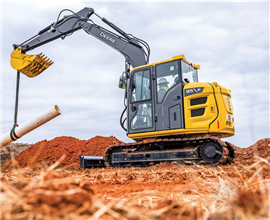John Deere reports on the status of its new excavator line
28 February 2024
A global leader in the manufacturing of construction equipment, John Deere continues to work on the design of a brand new excavator line following the dissolution of its joint venture with Hitachi, which officially ended two years ago. To find out where things stand with the new machines, we spoke to Amy Asselin and Derek Betcher at The ARA Show in New Orleans. Here’s what they had to say.
 John Deere displayed its P-Tier 85 excavator at The ARA Show in New Orleans. (Photo: John Deere)
John Deere displayed its P-Tier 85 excavator at The ARA Show in New Orleans. (Photo: John Deere)
In August of 2021, John Deere and Hitachi Construction Machinery announced the end of their long-standing joint venture, which saw the manufacture and selling of Hitachi construction equipment in the Americas under the Deere brand.
Fast forward to Conexpo in March of last year, and Deere was showing a sneak preview of a new Future Generations excavator line solely designed and produced by the US-based OEM.
Recently, at The ARA Show in New Orleans, we spoke to Derek Betcher from the John Deere Rental Team about the current status of the excavator line, as well as other things on the horizon for the company and its customers. Additionally, we followed up with Amy Asselin, global marketing manager, John Deere Excavators.
Rental Briefing: What’s happening with John Deere’s new excavator line?
Asselin: Excavators are such an important part of both the rental industry and the overall construction industry. They make up 40% or more of all equipment sales; it’s the dominant machine form. They are critical to every jobsite, often acting as the quarterback, so customers demand a lot from them.
At Conexpo, we shared a peek of our fully redesigned excavators and how we are committed to delivering an excavator line up that is dependable and reliable, highly productive, and easy to use. We are leveraging proven Deere enterprise tech stack to deliver the solutions that address our customers’ biggest challenges of labor availability, demanding uptime and reducing waste on jobsites.
We are currently in our Test Pilot program phase leveraging a variety of customers to run machines in their operations. This feedback will allow us to confirm we are on track and ready for full-scale production.
Rental Briefing: What’s the timeline for those machines coming to market?
Asselin: When the customers tell us they are ready and not sooner. It’s super important to us that they are carefully validated, not just by our engineers, but by our customers too. Our Test Pilot program puts a large fleet of our future excavators in customers’ hands, compiling tens of thousands of real-world hours so we can bring the best and most reliable machines to market.
Rental Briefing: Which brings us to what you have on display here at The ARA Show. Tell us about that.
Asselin: The excavators we had at The ARA Show include our newly introduced P Tier models. The John Deere 85 P-Tier excavator has some great updates.
It has 18% more horsepower than its predecessor, a redesigned cab, improved hydraulic flow... all the kinds of upgraded performance improvements you’d expect out of a new model. This is definitely a lot more machine, performance wise, than the previous model. That’s why it’s here at the show. This is a super-popular size class in rental; it’s like a really big mini [excavator], really versatile, and it’s going to bring more power for digging, but particularly for auxiliary attachments.
Rental Briefing: Is there an overarching goal that Deere wants to achieve with the “Future Generations” excavators?
Asselin: It’s simple: we want to provide our customers with an excavator that helps them make money through high performance, dependability, durability, a superior operator experience, and versatility over the lifecycle of the machine.
Rental Briefing: What do your customers say they want mostly from the excavators in their rental fleet?
Betcher: Everybody wants reliability. Everyone wants great support. Everyone wants good value. I’d say in rental, the durability to be able to stand up to the sometimes not-so-gentle nature of being in rental, that’s extra important.
Increasingly, creature comforts that can help keep operators are getting more important in rental. Historically, you’d say why would a renter really care about the creature comforts if they don’t own the machine? But operators are harder than ever to attract, and retain, and train, so having equipment that you can get a solid day’s work from and not leave the operator more exhausted than they need to be - that’s increasingly important, even for rental businesses.
That’s why you’re seeing increased adoption of cab, heat/AC-cooled seats. But rental in general wants something that’s proven; they don’t want to guinea pig it for the industry, they want to hang their hat on its dependability.
Rental Briefing: What is Deere’s position on the alternative power options that are coming onto the scene for earthmoving equipment?
Betcher: It’s important to point out that Deere is in ndustries that need power that ranges from 20 horsepower to 700-plus horsepower. That’s a huge range of applications.
We see a future where there needs to be a number of different strategies. There will be diesel engines in that future. There could be renewable fuels; ethanol is the renewable fuel of choice in some markets, Latin America especially. Hydrogen is a renewable fuel of choice in some markets like Europe. North America is probably in between the two and offers a really strong opportunity for biodiesel.
As an international company with international customers, we need an engine strategy that looks at a lot of those options.
There’s a lot of interest in the press about battery-electric vehicles. The power density required to run construction machines makes that a better fit on the medium and smaller end of the scale. We don’t want to over promise that there will be batteries in everything; we don’t think that’s a realistic expectation.
For several years we’ve been working on and sharing information about a battery-electric backhoe that’s been in customers’ hands and we’re now on our third generation of that.
One of the investments Deere made, to answer the tricky question of run life, is to invest in an Austria-based battery company called Kreisel Electric. That was Deere putting its money where its mouth is on answering the question of how to optimize battery-electric vehicles.
Rental Briefing: A couple of years ago, John Deere CEO John May gave a speech at CES in Las Vegas, telling the crowd that John Deere is now a “tech company,” not just an equipment company. What does that mean to rental?
Betcher: John Deere recognizes the role technology plays in addressing our industry’s biggest challenges of labor shortages, reducing waste and driving more uptime. The rental customers are a core part of the industry. It is a natural extension that machines that are rented will need to be able to offer some of the same solutions that someone may buy into their own fleet.
With the right technology, a less-experienced operator can be more productive with the machine when there are features that are intuitive, easy to use and help them get more work done.
STAY CONNECTED



Receive the information you need when you need it through our world-leading magazines, newsletters and daily briefings.
CONNECT WITH THE TEAM








